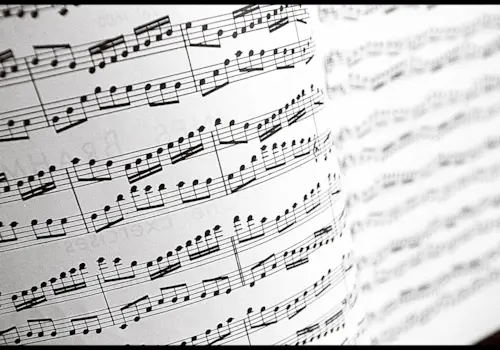O'Halloran's new solo album, 'Silfur', is out now on Deutsche Grammophon
Music and movement: The perfect marriage
My earliest memories of classical music involve Beethoven, Bach and Chopin. Later, I got into post-classical composers like Glass and Scriabin, who wrote more dense, dissonant works than those I heard in the ballet rehearsal room. In terms of my compositional career, I had some early lessons with the organist at my mother’s church.
My mother was a ballet teacher, I would go down to her classes as a young boy and listen to the pianist playing the rehearsal music on an upright piano. She was trying to get me to be a dancer, but I was more interested in what the pianist was doing! From a young age, I loved the combination of music and movement, which to me is a perfect marriage. As an adult, I was lucky enough to work with Wayne McGregor, who is such an incredible choreographer. We worked on four shows at Saddler’s Wells, and my mum came over from the US to watch, which was a very special moment for me.

Dustin O'Halloran. ©Anna Maggý Grímsdóttir
Composer vs pianist
I didn’t study at a conservatory and worked hard to teach myself theory and performance, not just on the piano but in guitar and electronics. As a pianist, I do have some performance limitations, but I try to use those in a positive, creative way. Being a concert pianist is such a different path to a composer; it’s less about keeping your hands, mind and body in peak condition, and more about experimentation and collaboration. Not going to music college also meant I didn’t have any of the usual roadblocks, no voice inside my head saying I wasn’t good enough or external pressures from teachers. Sometimes I wish I had the advanced technique, but creatively I’m glad I could explore the music I love without those limitations.
My route into compositions was initially through my band, Dévics, which I formed in Los Angeles with Sara Lov in 1998. Coming into composition from an electronic, rock background, you try to find your voice, using the skills you have – any progress is on your own terms, which in many ways is a healthy approach.
"The piano is a very complete instrument"
Music is so vast, so expansive in terms of styles and genres, and making great electronic music isn’t any easier than acoustic classical. It’s much less about the muscle memory of playing an instrument, but your aural skills; listening and understanding is critical. I love the piano, it’s a very complete instrument – you can be alone with it, you can explore so much in terms of the soundworld. There’s still so much for me to learn and that’s exciting. In a way, being too expert at something would be a negative as you may no longer feel the need to master it!
There are so many ways to record the piano. In the last decade, musicians have really been exploring ways in which to exploit the instrument: by adding felt buffers, performing on an upright, recording things very closely. Those are techniques that were used in rock records in the past, now moving across into contemporary classical production. Setup is something I think about when recording, almost using the studio itself as an extension of the instrument.
Whenever I’m recording with the piano, we use a lot of microphones in different positions, not just overhead mics like you’d see in a classical space, but up close, hanging over the top or back of the instrument, or coming up from the floor. I love to capture the sound of the hammer, those little noises that give the piano a different life. Perfection is overrated, we should encourage experimentation and it might well lead to new ways of working.

Dustin O'Halloran's new album, 'Silfur', is out now
My new album Silfur is actually a revisit of some of my earliest works, released over fifteen years ago. In re-recording them, I enjoyed putting space in the music, allowing certain tracks to take on a simplicity if that’s what they required, or even asked for. I look back on the older recordings now and feel that there’s a sense of time within them. Each note feels more essential than perhaps it would have been when I first recorded them.
These pieces are a diary of my life. There are some pieces I didn’t want to go back and record, some I didn’t feel were speaking to me now. I tried to choose works I felt had some relevancy and stood the test of time for me, and I wanted to give them something new, something extra in the re-record. Recording music is always a spiritual journey, and when you get older you take your ego out of the music. It’s still you, but you’re searching for something bigger.
Dustin O’Halloran new solo album, Silfur, is out now on Deutsche Grammophon. Stream it below.
Keep up to date with Dustin on Facebook, Instagram and Twitter.








